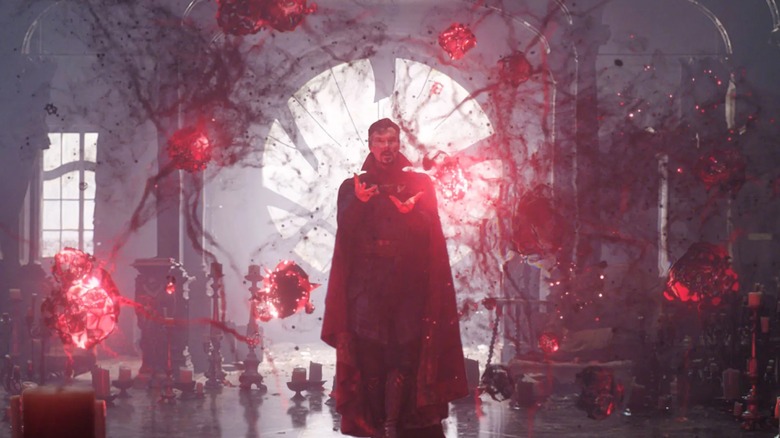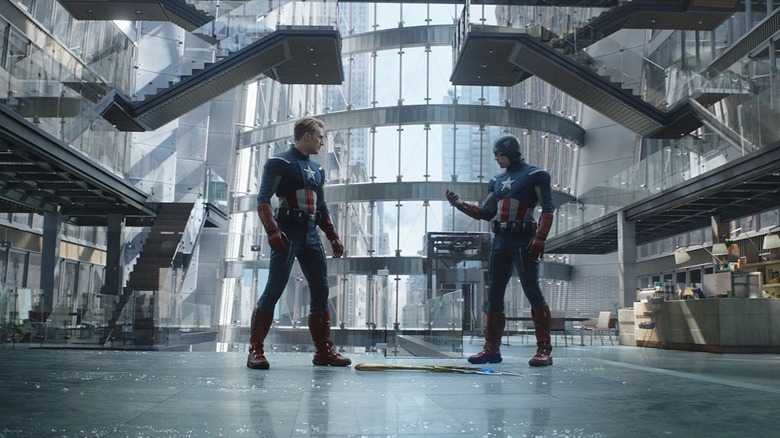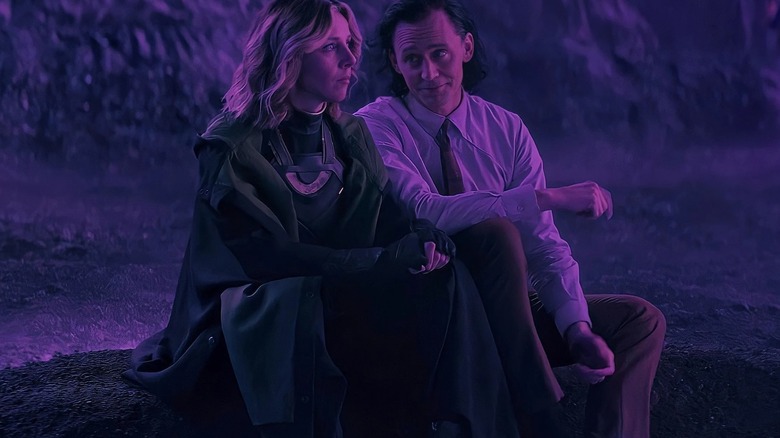There's Some Real Science Behind The MCU's Time Travel Shenanigans
As a narrative device, time travel can potentially introduce interesting ethical conundrums to a story, especially when it plays around with established mechanics to suit its world-building. The Marvel Cinematic Universe has always been chock-full of intriguing stories about worlds overrun with superpowered entities, but as soon as time travel was added to the mix, the trajectory of the MCU changed forever. The Time Stone was first mentioned in "Guardians of the Galaxy" and was expanded upon in "Doctor Strange," where time reversal was an integral aspect of the central battle between Strange (Benedict Cumberbatch) and Dormammu (voiced by Jonathan Adams). Subsequently, the franchise's most ambitious foray into the concept took place in "Avengers: Endgame," which follows a time-heist plotline using the Quantum Realm as a foundation for the events that unfurled.
The MCU's time travel shenanigans definitely have some loopholes when inspected through the lens of quantum physics, which is perfectly fine — after all, scientific accuracy is secondary to amping up stakes that contribute to future storylines, at least when it comes to a franchise with innumerable stories to offer. However, there was a reason why "Endgame" made it a point to clarify that the film's time travel did not follow the rules of "Back to the Future" — a landmark film in the genre — but instead leaned more towards timeline branching, allowing original timelines to exist without alteration.
For one thing, following "Back to the Future" time travel rules would make it impossible for us to keep track of a million micro-events, creating temporal anomalies within the storyline that would have been a nightmare to resolve. Secondly, there is some amount of scientific basis behind the MCU's time travel logic, according to MCU screenwriters Christopher Markus and Stephen McFeely. Here's what they had to say.
Leaning on quantum theory
Markus and McFeely have tirelessly worked on various MCU projects over the years, from all three "Captain America" movies to "Infinity War" and "Endgame." Speaking to Gothamist about the use of time travel in "Endgame," the duo explained that this mechanic in the film was necessary to introduce surprise stakes for audiences and followed rules that were in keeping with quantum theories about time travel after they consulted quantum physicists during the filming process. McFeely said:
"We actually brought in two quantum physicists, to ask their opinion about time travel and how if it could be real — how would it work? And both of them said, well, given what we know about particles at the quantum level where new research indicates that the same particle can be in two different places at the same time on the quantum level, that maybe the Quantum Realm established in Ant-Man might allow for some time travel."
Quantum theory about time travel also leans towards the multi-timeline theory, where the act of traveling forward or backward in time would create a branched reality instead of reversing the canon established in the original timeline. This directly feeds into the multiverse in some sense, especially with how "Loki" treats branched timelines to establish the rules of the Time Variance Authority (TVA). While multiverse jumping is an integral part of the MCU multiverse, branched realities allow fresh stories to gain momentum, as evidenced by Wanda Maximoff's arc in "Doctor Strange and the Multiverse of Madness." The duo also clarified that this approach gave rise to "a system that allowed for things to stay the same in [one's] present reality," which helped make these major temporal events more digestible for audiences.
Establishing new rules
Most established time travel tropes in fiction edge towards the Grandfather Paradox, which posits time-space causality as a serious consequence of time travel, leading to rules about never crossing paths with one's past or future self. This assumption can obviously be subverted to introduce intriguing dilemmas: One has to look no further than Netflix's "Dark," which uses time travel to create an intricate puzzle box about personal legacies and the cost of difficult choices. While the MCU has not dived into quite that level of intricacy (yet), the franchise timeline-branching stance potentially allows future stories to play around with established rules and even break them while still being true to the theoretical aspect of the concept.
This means no one can actually erase the past or alter it in the original timeline, but instead, they create an alternate timeline where the intended alteration occurs. Markus explained this stance in detail:
"We did test screen the movie ['Endgame'] and found that there were people not grasping our version of time travel, and it was causing questions at the end because they were basically relying on 'Back To The Future' for their time travel knowledge. So we had to put in some clarification scenes of exactly what we were talking about to differentiate it, so that people wouldn't wonder why Nebula didn't disappear when she shot herself and things like that."
Whether the MCU's time travel rules will undergo changes in the near future is something only time can tell, but for now, the franchise seems to be sticking to at least some amount of scientific basis when it comes to this trope. As for what the future(s) hold, who knows?


